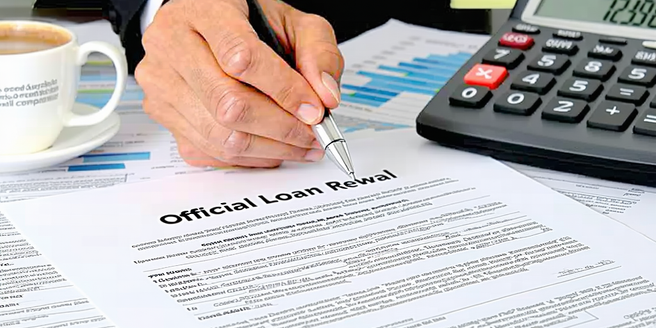Understanding the Basics of Loan Renewal
| Concept | Definition | Importance |
| Loan Renewal | Extending the term of an existing loan | Ensures continued funding |
| Interest Rate | Rate charged for borrowing | Impact on overall loan cost |
| Credit Score | Score evaluating creditworthiness | Crucial for renewal approval |
| Documentation | Paperwork required for process | Ensures application completeness |
| Repayment History | Record of past payments | Demonstrates reliability |
Key Factors Influencing Loan Renewal Approval
When a loan reaches its maturity, the renewal process can be more than just a formality. It requires attention to several critical factors that might influence approval. Foremost among these factors is the borrower’s credit score. A higher credit score generally translates to lower risk for lenders, making renewal more likely. Additionally, the borrower’s repayment history plays a significant role. Lenders need assurance that the borrower has been diligent in fulfilling previous obligations. Debt-to-income ratio is another determining factor, influencing the perception of the borrower’s capacity to manage additional debt responsibly. Finally, the current economic environment can sway lenders’ decisions. In uncertain economic times, lenders might tighten their standards, affecting the renewal prospects even for previously reliable borrowers. Understanding these factors can better prepare individuals when they approach the renewal process.
How to Prepare for a Loan Renewal Application
Preparing for a loan renewal requires strategic planning and attention to detail. The first step is to review the current loan terms and ensure all previous payments have been made on time. Lenders place significant importance on consistent repayment behavior, as it indicates financial reliability. Additionally, borrowers should acquire all necessary documentation, such as proof of income, updated financial statements, and a comprehensive list of assets and liabilities. Updating your financial information not only shows credibility but also aids in making a compelling case for renewal. It’s also prudent to check your credit score and address any discrepancies prior to reapplying. Being proactive in identifying and correcting any issues can prevent unnecessary hurdles. Lastly, understanding current market conditions and interest rates can provide leverage when negotiating new terms, ultimately leading to a more favorable renewal agreement.
Common Mistakes to Avoid During Loan Renewal
When approaching a loan renewal, certain missteps can derail the process and lead to unfavorable outcomes. One prevalent mistake is neglecting to review your credit score and report for inaccuracies. Overlooking this can result in the lender perceiving the borrower as a higher risk than they actually are. Another common error is failing to update financial documentation. Inaccurate or outdated information can delay processing and raise red flags for lenders. It’s also a mistake to ignore existing debt obligations; lenders assess overall financial health, and high debt levels can jeopardize renewal chances. Furthermore, not being prepared to negotiate terms can leave a borrower settling for less favorable conditions. Finally, an inflated sense of security from past loan experiences might lead to complacency, but each renewal is an opportunity to reevaluate and make informed financial decisions. Avoiding these pitfalls can promote a smoother renewal process.
Comparing Loan Renewal and Refinancing Options
Loan renewal and refinancing are two strategies for managing debt, each with distinct benefits and considerations. Loan renewal involves extending the existing loan’s term, typically with the same lender. It may be an attractive option for maintaining continuity and potentially simplifying the process, as existing terms usually extend with minor adjustments. However, interest rates might not significantly change, and renewal terms could be less flexible. In contrast, refinancing involves replacing the current loan with a new one, potentially with different terms and a different lender. Refinancing can offer the opportunity for more favorable interest rates or adjusted payment schedules, suitable for those looking to reduce monthly payments or alter their financial commitments. The decision between renewal and refinancing hinges on one’s financial situation, objectives, and market conditions. Evaluating both options can assist bإorrowers in making a decision that aligns with their financial goals.
The Role of Credit Score in Loan Renewal Terms
A borrower’s credit score is a pivotal factor in the assessment of loan renewal applications. Credit scores provide lenders with a snapshot of the borrower’s financial responsibility and likelihood of repaying the loan. Typically, a higher credit score results in more favorable renewal terms, such as lower interest rates and flexible conditions. It reflects positive financial behavior, including timely payment habits and responsible credit management. Conversely, a lower credit score might result in stricter terms or potential denial of renewal. Lenders view low scores as indicators of risk, prompting them to tighten conditions or even reject applications. Thus, borrowers are encouraged to maintain healthy credit scores through regular payments, reduced credit utilization, and addressing credit report discrepancies. Consistently striving to enhance or sustain a strong credit score is essential to securing advantageous loan renewal terms in the future.
Negotiating Favorable Terms in Loan Renewal
During the loan renewal process, borrowers have the opportunity to negotiate terms that better suit their financial situations. Preparation is key to successful negotiations. Begin by researching current market interest rates; awareness of prevailing rates can provide a benchmark for negotiation. Furthermore, approaching the lender with a clear understanding of your credit history and repayment track record can strengthen your bargaining position. Highlighting consistent and timely payments demonstrates reliability and may encourage the lender to offer more favorable terms. It’s also beneficial to express any specific needs, such as longer loan terms or adjustable payment schedules, directly with the lender. Demonstrating a comprehensive grasp of one’s financial situation and conveying this effectively will aid in ensuring any adjustments made align with personal financial goals. Approaching the negotiation process with confidence and preparation can significantly enhance the renewal terms presented by lenders.
What to Expect in a Loan Renewal Contract
A loan renewal contract is pivotal in extending an existing loan agreement while possibly adjusting terms. Borrowers should expect a detailed outline of the new loan term duration, which may either stay the same or be altered based on negotiations and credit assessment results. Revised interest rates might also be part of the contract, reflecting current market conditions and the borrower’s credit profile. The renewal contract will specify the updated payment schedule, including the amount and frequency of payments. Additionally, any new fees or penalties associated with the renewal process will be detailed within the document. Transparency is essential, so the contract should also highlight any changes in conditions or clauses from the original agreement. Borrowers are encouraged to review the contract thoroughly, ensuring all aspects align with their expectations and any previously negotiated terms. A comprehensive understanding of the renewal contract ensures clarity and prevents unwelcome surprises.
Frequently Asked Questions About Loan Renewal
When considering loan renewal, borrowers often have several questions. A common inquiry is about preparing for renewal. It’s advisable to have up-to-date financial documents and payment records readily available. Borrowers also wonder about the impact of loan renewal on their credit score. Generally, timely renewals can positively impact credit health if payments continue to be made on time. Many also ask about potential changes to interest rates. Interest rate adjustments depend on creditworthiness and prevailing market rates. Additionally, concerns about eligibility often arise; maintaining a good repayment record significantly enhances renewal prospects. Borrowers might also question the difference between renewal and refinancing. While renewal extends the current loan, refinancing involves securing a new loan entirely. Understanding these distinctions and preparations can equip borrowers with confidence and clarity when navigating the loan renewal process.
Steps to Take If Your Loan Renewal Is Denied
A denied loan renewal can be disheartening, but it isn’t the end of the road. Understanding the reasons behind the denial is the first step. Lenders often provide a rationale which can spotlight areas needing improvement. If credit issues contributed to the denial, obtaining a credit report and addressing any discrepancies or debts is crucial. Additionally, reviewing and improving one’s financial health, such as increasing income or reducing outstanding debts, can enhance creditworthiness over time. Consulting a financial advisor can provide insights and strategies tailored to specific situations. Furthermore, considering alternative funding options, such as smaller loans or different lenders, might offer temporary solutions while addressing the underlying issues that led to the denial. Remaining proactive and addressing these areas can improve future approval chances, turning a setback into an opportunity for financial growth.



